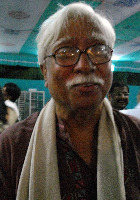Mohammad Rafiq
Mohammad Rafiq Poems
This unfamiliar tree bearing fruit over here
it's my mother
mango and rose-apple, pomegranate, pear
or maybe star-apple, hogplum too
...
Just inside the courtyard, on the left an ancient guava tree,
planted by father’s father-in-law; on the north side the kitchen,
after four monsoons slanted completely eastward;
the white faces of three widows, an oil-lamp burning in the dark;
...
drums and gongs call it dawn
as if it might rain today
the sun hasn't reached the lotuses yet, their petals
are still curled up, the screwpine, jasmine, and chameli
...
The moon struck them as a little more shameless that day
they felt as if the snake really lay hidden in the grass too
By then even the girl's moans had become stifled
their slightly guilty expressions were washed away by indifferent dew
...
At the river's edge ambushing
shadows huddle in the mud
rasping breaths echo in the dusk
it's only evening, not doomsday
...
Enough—such terrible cold—it's dawn
his eyes opened slowly—look
a pair of mynahs come up to the window
in the ground, talking beak to beak, wing to wing
...
Brine-encrusted wall . . . snake drooping over a beam
dusk approaches with a sigh . . . scraps of crumpled paper
scuttle across the floor . . . a window has blown open
the chill wind sweeps in whooping and wailing
...
With the meeting of the Baleshwar and Pashur in his heart
the man floats till he reaches dry land
Mehendigang market, Char Baisha's shrine
...
Oh the girl’s tresses unloose themselves,
her clothes fly away,
in the flame-orange of her body comes the dawn,
in the beckon of her enchanting smile the morning follows.
...
at every instant, this possibility remains:
instead of one footfall, another footfall.
to jump the fence of a particular simile, metaphor, or symbol
and find some other unknown style, meter, or tempo.
...
At midnight the moon was lying across
Padma and Jamuna's sand-and-water-covered cot
...
Covered by an instant's nakedness. the drum-roll of mid-monsoon rain.
primal sound rumbles up from Omkarnath's throat.
Ramkinkar's Santhal family. stillness, motion.
in the primal touch of skin, the stretching of sun and moon. stars and soil.
...
Ho now, Beguni! your lover's coming tonight
so comb your hair, coil your braids high
hush, Kirtinasha's rising, racing, drenched in desire
under the last full moon in this season of sighs
...
Mohammad Rafiq Biography
Mohammad Rafiq (Bengali: মোহাম্মদ রফিক) is a prominent Bangladeshi poet. Early Life Rafiq was born in 1943 in the village of Baitpur, Bagerhat, Bangladesh (then East Pakistan). In his youth, his country was going through a political instability. During his student life at Dhaka University he was a political activitist and was arrested and jailed twice. Pakistani martial law court sentenced him ten years of hard labour. He later was released earlier to complete his university studies. During the War of Independence of Bangladesh Mohammad Rafiq served as a Sector-1 commander and motivated the freedom fighters. Later he worked with the famous Radio station of Independent Bengal (স্বাধীন বাংলা বেতার কেন্দ্র). Bangladesh and Autocratic Regime Through Mohammad Rafiq's dozen volumes of poetry, Bengali readers have witnessed not only the evolution of a distinctive personal vision and style but also a reflection of the changing fortunes of a homeland—all against a backdrop of folk tradition (a typically Bengali mix of Hindu and Muslim lore) and timeless images of water and sky, sun and rain, clouds and dust. This is not to say that Rafiq's poems tend to be predominantly "political" (other poets of Bangladesh more regularly respond to specific events and issues). Rather, an awareness Bangladesh's freedom struggle, the time of idealism and hope after independence, and the long dark period of military rule after the assassination of the new nation’s first democratically elected leader, Sheikh Mujib Rahman, should help readers from less turbulent parts of the world understand the potentially explosive impact of a particular literary work and the extraordinary risks that a writer may take in writing and publishing it. When Hossain Muhammad Ershad—a dictator who fancied himself a poet—seized power in 1982, the people of Bangladesh had to endure crushing repression from his regime and from the growing forces of communalism. During the dictatorship of Hossain Muhammad Ershad, Rafiq wrote Khola Kabita (Open Poem) and it was published as a leaflet and was circulated throughout the country. It was the first voice raised against the unlawful military autocracy. It become very popular among the student activists and they performed the poem as drama and song. Later on, he was summoned and interrogated before a military board of inquiry. A warrant for arresting him was also issued. By this time, Mohammad Rafiq escaped and began to live in hiding. Teaching Career & His Awards Mohammad Rafiq worked as a teacher at Chittagong Government College and at Dhaka College. After working in the Department of English, Jahangirnagar University for three decades, Mohammad Rafiq retired in 2009. He received Alaol Literary Award in 1981 and Bangla Academy Awardin 1987. In 2010 he won the prestigious "Ekushey Podok.")
The Best Poem Of Mohammad Rafiq
My Mother
This unfamiliar tree bearing fruit over here
it's my mother
mango and rose-apple, pomegranate, pear
or maybe star-apple, hogplum too
guava, pomelo, kamranga
so much pain and love, sacrifice and patience
as if all the pronouns of the world
the adjectives, nouns, and prepositions
of a village too, a field, a map with no form
are my mother's other names
expelled from heaven
crossing timidly over to the underworld
